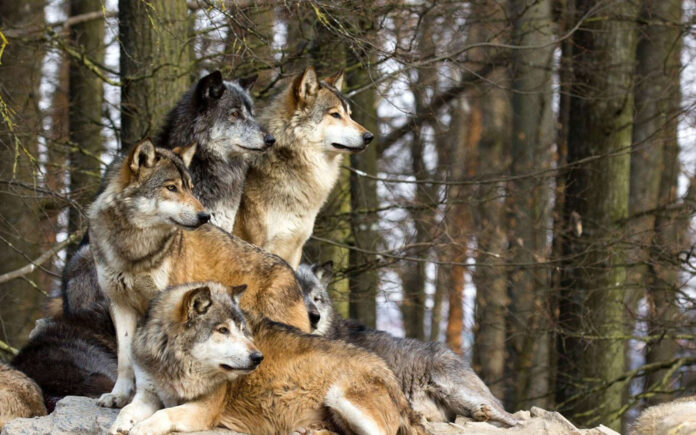
Bev Truss
THERE are lots of theories on how wolves decided to interact with humans. Did we ‘adopt’ the cutest or the abandoned wolf cubs? Highly unlikely, as we now know, with scientific research, living with a sociable wolf as a family pet is next to impossible. Domestic dogs evolved from a group of wolves that came into contact with European hunter-gatherers between 18,800 and 32,100 years ago; this wolf has since died out. Can you imagine 32,100 years ago trying to hunt to feed your family, let alone a large wolf, who could kill you over a meal. The hunting hypothesis, that humans used wolves to hunt, doesn’t hold up. Humans were already successful hunters without wolves, more successful than every other large carnivore. People have a long history of eradicating wolves, rather than trying to adopt them. Over the last few centuries, almost every culture has hunted wolves to extinction.
The most likely explanation is that they probably domesticated themselves. Humans living in groups and villages would have waste dumps and some clever wolf figured there was an easy meal to be had by scavenging in these dumps. So the wolves who weren’t afraid to run when they saw people or didn’t attack because that would get him killed, hung around and saw humans as an easy meal ticket. A few hundred years later, these wolves would be living in the village and if they were cute enough and didn’t run, the people would perhaps encourage them to hang around as an early warning system when they would bark in response to danger. Not only did the behaviour of this ‘protodog’ change but so did its body shape and looks. Long floppy ears, puppy like small heads, smaller body, brain and skull developed, as did the ability to read humans gestures and language. The domestic dog or canis familiaris lost its fear of humans and started to follow on hunting expeditions, helping track down prey and received food in return.
So they became very useful to have around as, guard dogs, as help during the hunt, perhaps as a companion and play mate for early human children and, a bit unpleasant to think about, but a ready meal when times were tough.
It looks more and more likely that this now extinct wolf adopted us; dogs may even have been the catalyst for our civilization.
If you would like to know more about how dogs came to be on the sofa, Professor Raymond Coppinger will be holding a full day seminar in Dublin on June 28 on this subject and what makes our dogs tick. Professor Coppinger is one of the world’s most renowned experts on dogs, having written and published, along with his team, over 70 books and science papers on all things dog.
The seminar is open to everyone who has a dog, or wants to know more not just professional trainers, groomers, vets and vet nurses.
For more details on this special event, see www.apdt.ie/events or you can give me a call. This will be Professor Coppinger’s first time in Ireland and his last visit to Europe. If you want to know more about dogs then this is the Dog Day Out for you.
A native of Ennis, Colin McGann has been editor of The Clare Champion since August 2020. Former editor of The Clare People, he is a journalism and communications graduate of Dublin Institute of Technology.


